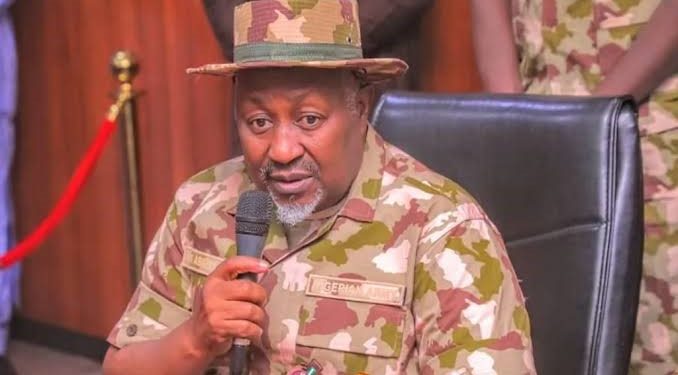The Minister of Defence, Mohammed Badaru Abubakar, has linked the recent resurgence of Boko Haram attacks in Borno State to the group’s broader plan to destabilise the Sahel, affecting countries such as Nigeria, Mali, Burkina Faso, and Niger Republic.
Badaru made the statement while addressing journalists in Kaduna on Tuesday, during a two-day working visit to key military institutions in the state.
These included the Buffalo Engineering Technical Services, the Air Force Institute of Technology, and the Nigerian Defence Academy (NDA).
“There is a renewed vigour by the insurgents to destabilise the Sahel.
“We are doing a lot to curtail them, and if you will be fair to us, you’ll notice that in the past week or two, the armed forces have gained momentum—attacking and eliminating them. The serial attacks on soldiers’ camps have been reduced to the barest minimum,” Badaru stated.
He gave assurances that the federal government was working tirelessly to respond to growing security threats across the North-East and North-Central and other regions.
Specifically on the escalating violence in Benue State, the minister explained that the crisis was mainly communal, driven by recurrent clashes between farmers and herders.
According to him, the solution requires a largely non-kinetic approach.
“We are working on resolving these conflicts by engaging communities and ensuring herders remain within designated grazing areas. We are making progress in both providing security and preventing further violence,” he said.
On the broader security landscape, the minister acknowledged that while significant gains had been recorded against banditry in the North-West, other regions continued to experience attacks, reflecting the evolving nature of insecurity in the country.
“In the North-East, especially Borno State, we’ve witnessed the resurgence of Boko Haram, which aligns with what is currently unfolding in the Sahel.
“If you are following developments in Niger, Burkina Faso, and Mali, you’ll see that attacks have intensified across the region.
“Our troops are doing wonderfully well. It’s a new threat, and we are tackling it. We will overcome, and normalcy will return – by the special grace of God and your prayers,” he said.
He also commended the combined kinetic and non-kinetic efforts by the armed forces and the Kaduna State Government to restore peace in Birnin Gwari and other troubled parts of the state.
“Markets have reopened, and traffic is now flowing in and out of the local government area unhindered,” he said.
Badaru expressed satisfaction with the level of advancement in research and development (R&D) achieved by Nigeria’s military institutions, highlighting ongoing efforts to achieve self-sufficiency in locally made military equipment.
“The institutions are doing a very good job. They are following the President’s directive for deep research so that we’ll eventually become self-sufficient in our military requirements—including platforms and equipment needed for our armed forces,” he said.
He cited the repair and maintenance of Mine-Resistant Ambush Protected (MRAP) vehicles as one of the major milestones.
“Most of the damage to MRAPs is being repaired here. We’ve seen commendable work in maintenance, innovation, and development. The new Buffalo MRAPs and other equipment produced are really impressive,” he said.
On military training, Badaru reaffirmed the Federal Government’s commitment to strengthening officer education at the NDA.
“Training is critical to any development, especially within the armed forces. We will continue to support the Nigerian Defence Academy to ensure the cadets are well-trained and emerge as highly capable and committed officers,” he said.









